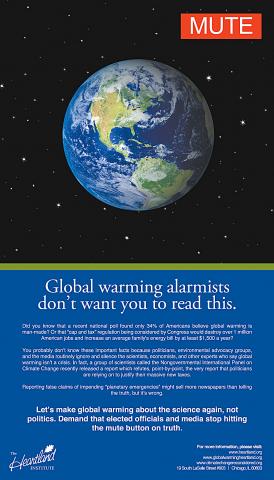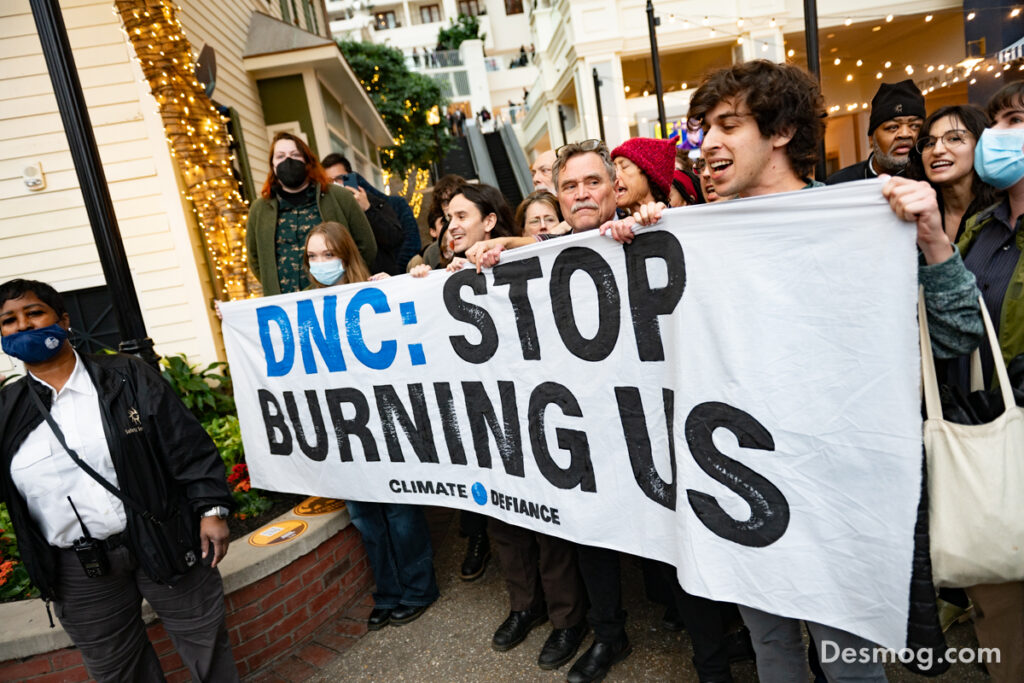You can often judge progress by the reaction of those opposed to it. If that’s true, we may finally be getting somewhere.
The notoriously unethical Heartland Institute is blowing a bundle of cash in an all-out effort to derail climate change legislation moving through Congress. The Heartland folks have never been overly encumbered by either ethics or accuracy and their latest effort is no exception.
Heartland is fronting three full-page ads in the Washington Post, transparently targeted at lawmakers now horse-trading over the draft American Clean Energy and Security Act (ACES).
So what does that kind of action cost? According the Washington Post website, close to $250,000. But that is pocket change for Big Oil and Big Coal, who stand to lose big if US climate policy moves into the 21st century.
The ads deadpan three hilariously audacious whoppers:
- Climate deniers lack access to the media or politicians,
- Climate scientists the world over are part of some grand conspiracy to deceive the public, and
- You should instead trust a “non-profit” organization with a budget of $5.2 million that refuses to disclose its funders.
I’ll deal with the content of the full-page propaganda effort in a separate post but the first thing to note is the desperation of the tactics.
These are sophisticated players and such ham-handed lobbying techniques are typically a last resort in the public relations toolkit. This latest move illustrates just how isolated vested oil and coal interests have become in the climate change debate.
Lets start with their natural allies. The US Chamber of Commerce is already dealing with a revolt in their ranks over their long-standing opposition to meaningful climate legislation.
Trade unions have joined forces with long-time adversaries in the environmental movement to demand a 25% national renewable energy standard (RES) by 2025 – a move they have shown will generate 850,000 manufacturing jobs in fifteen years.
Another study by the Consumer Federation of America found an RES of 25% would also save U.S. consumers $200 billion a year in differed energy costs by 2030.
The reason that such a broad coalition of former foes is coalescing around the clean economy is simply that it is good business.
Even before the mountain of public money poured into building America as a global leader in the renewable energy sector, clean tech and green jobs were growing 250% faster than the rest of the economy.
A number of studies have shown that renewable energy technologies provide four to six times as many jobs as equivalent investments in fossil fuels.
Ambitious renewable energy standards in California have already led to a boom in green collar jobs. In 2007 alone, California saw the opening of 10,209 businesses with 125,390 jobs. Green venture capital investments in the Golden State totaled a whopping $6.6 billion from 2006 to 2008.
A recent economic study from Berkeley concluded that even more ambitious state investments in the renewable sector could help the beleaguered California government balance their books. Researchers predict that a statewide RES of 50% by 2050 would generate 500,000 jobs and $100 billion in cumulative payrolls over the next 40 years.
The same has already proved true for the entire nation. Even though renewables currently only supply 10% of US energy, the sector already employs half as many people as the conventional energy sources.
“The clean energy economy is poised for explosive growth,” said Lori Grange, deputy director of the Pew Center, which recently authored a green employment analysis.
“These jobs are driving economic growth and environmental sustainability at a time when America needs both. There is a potential competitive advantage for federal and state policy leaders who act now to spur jobs, businesses and investments in the clean energy sector.”
So if investing in green energy is such a boon for the economy, the ACES bill must be sailing through Congress right?
Hardly. Vested interests with very deep pockets still have considerable influence and the draft bill has already been significantly watered down.
While the President and the renewable energy industry are demanding a RES of 25% by 2020, the draft bill has since been dialed down to a mere 15% by 2021 during its murky journey through Beltway backrooms.
This is less than many state requirements, creating the real danger of a meaningless national energy standard. Leaders in the emerging green economy are understandably disgusted.
“The current legislation does not create jobs and, more importantly, does not effect the sea change that President Obama sought,” said Don Furman, president of the American Wind Energy Association.
Ham-handed does not mean ineffective. The corporate pushback on the climate bill is very real and increasingly desperate. It is telling that Big Oil and their allies have enlisted the help of such unsavory actors as the Heartland Institute and rolled out such unethical tactics as questioning the rock-solid scientific consensus on climate change.
Watch this struggle closely – nothing less than the future of the US economy hangs in the balance. But I wouldn’t be betting on Big Oil winning the war just yet.
The gathering massive coalition demanding a green energy future means politicians are increasingly aware that siding with the past will endanger their future.
Subscribe to our newsletter
Stay up to date with DeSmog news and alerts







